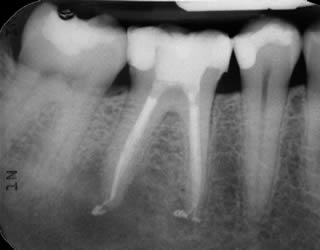Endodontic Treatment Recovery

Advice on what to expect following root canal therapy.
Root canal treatment may cause anxiety in some patients when they are told that they need it and this is understandable given its historical bad press.
Fortunately, this anxiety is generally unfounded and a root canal procedure should cause no more discomfort than most other invasive dental procedures. A combination of an effective local anaesthetic and the skills of our Ipswich dental team, means that patients should have no cause for concern and any discomfort should be minimal.
Before we look at ways to help you recover from the procedure; our principal dentist Hiten Pabari offers a brief reminder about why endodontic treatment may be needed.
Nerve damage
Where a tooth has become damaged or decayed, bacteria can sometimes reach the root canals of our teeth. These are the ‘prong’ like parts that go down into our jawbone. In these canals are blood vessels, and, most notably for patients, the nerves. If bacteria enter this part of the tooth and damage the nerves, it is almost certain that you will know about it due to the pain which can become quite severe. Unlike decay in other parts of the tooth, the canals cannot be treated using a regular filling, and a root canal treatment will be necessary.
Although some patients may feel reluctant to have this treatment, for reasons mentioned above, there are really only two other alternatives. One is to live with the pain, which will only get worse and is something that, even if you can stand it, we certainly don’t recommend. The other is to extract the tooth. Whilst this would eradicate the pain, it would mean that you risk other teeth from becoming misaligned or would need to consider a replacement option, such as a bridge, denture or dental implant.
Using root canal treatment, we can usually save your natural tooth, giving it a reasonable level of strength and function.
Treatment
We have covered the actual treatment in an earlier blog, but to briefly remind patients of the Foxhall Dental Practice, this involves accessing the root canals and removing the infected material. The now hollow canals are cleaned and then filled with a material called gutta percha before finally attaching a dental crown to complete the treatment.
Aftercare considerations
Patients should know that a root canal treated tooth is, despite being a preserved natural tooth, not quite the same as a healthy tooth in two key ways. First of all, because it now has no nerves, it will have no sensation. Secondly, although strong enough for everyday use, it will not be quite as strong as a healthy tooth and this leads us on to our first aftercare point.
Eat cautiously
A combination of a lack of nerves within the tooth, and it’s slightly weakened structure, means that it can be difficult to judge how hard you are biting down on something. For this reason, we recommend that you avoid the use of this tooth when eating harder foods. So you should be slightly more cautious of your diet, especially if more than one tooth has received endodontic care.
Residual discomfort
As with any invasive dental treatment, there may be some minor discomfort following the procedure due to inflammation of the soft tissue surrounding the tooth. This is natural and can be eased through the use of your regular pain killing medication. Any discomfort should only last for a few days however, and, if it lasts longer or you feel that it is getting worse during the first few days, please contact our Ipswich dental clinic for further investigation.
Cleaning the tooth
You should treat a root canal treated tooth as you should a healthy natural one. Although you will have lost the senses in that tooth and are therefore unable to feel toothache, it can still become damaged. In addition to this, gum disease around the tooth is likely if you don’t follow a good oral hygiene regimen, including flossing. This could ultimately affect not only the treated tooth, but others around it too.
Medication
In some instances, we may provide antibiotics following your treatment. Although this is not common practice, if we do prescribe you antibiotics, please make sure that you take the medication as suggested and finish the course.
General health
Smoking and excess alcohol consumption are both significant contributors to gum disease and other oral infections. To keep your restored tooth, and your mouth in general, in good health, we strongly recommend that you moderate or better still eliminate, potentially harmful habits such as these.
Follow up appointments
Although we are always available if you have any problems or concerns following your treatment, you should also make sure to attend our practice for any follow up appointments that we suggest. Monitoring the newly treated tooth will give you peace of mind as well as helping to make sure that there are no problems following the treatment. As always, our dental team are happy to answer any questions that you might have about any procedure that you need. Questions about root canal treatment are common and understandable and we are always happy to help!
For any appointments, whether routine or emergency, you can contact the Foxhall Dental Practice by calling us on 01473 258396.
